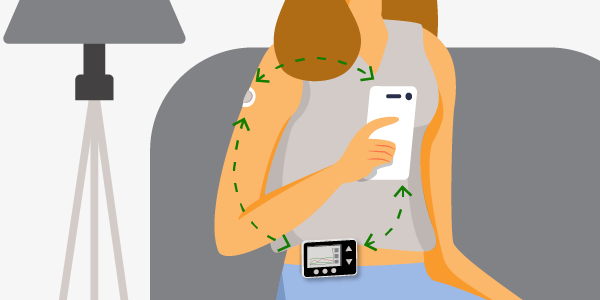New Diabetes Canada Guidelines: AID Systems Should Be Used for T1D Management

Diabetes Canada's March 2025 Clinical Practice Guidelines now recommend that all individuals living with type 1 diabetes (T1D) should use Automated Insulin Delivery (AID) systems, provided they are willing and able to wear and operate them.[1]
AID systems, which combine insulin pumps with real-time continuous glucose monitoring (rtCGM) systems, are now recognized as the preferred treatment for T1D—and are clinically proven to support better health outcomes, including a reduction of diabetes burden along with improved A1C and time in range (TIR).[2]
This recommendation is supported by the highest level of evidence (Grade A, Level 1).1 Clinical trials have demonstrated that AID systems reduce the frequency of hypoglycemia and fear of hypoglycemia, improve hypoglycemia awareness, decrease diabetes distress, and enhance overall quality of life. Notably, these benefits are achieved without increasing the risk of diabetic ketoacidosis (DKA).1
Three of the four AID systems currently available in Canada utilize Dexcom rtCGM as part of the automated insulin delivery functionality. With integration across both Dexcom G6 and Dexcom G7 (see below), healthcare providers can confidently recommend continuous glucose monitoring solutions that support the individual’s preferences, knowing their patients will benefit from accurate, real-time CGM data and proven clinical outcomes.
Early Use of rtCGM Matters: Clinical Data Shows Benefits Before Pump Initiation
Dexcom rtCGM is recognized as the most connected brand in the world,*,[3] offering real-time continuous glucose monitoring systems that easily integrate with leading AID systems. This connectivity enables healthcare providers to support greater flexibility and choice in insulin pump selection, allowing treatment decisions to align with the individual’s unique needs, lifestyle, and preferences for truly personalized care.
Recent clinical evidence underscores the importance of starting rtCGM early following diagnosis, even prior to starting insulin pump therapy. One study of adults newly diagnosed with T1D demonstrated that those who began using rtCGM within the first year had better glucose outcomes and fewer diabetes-related emergency department visits compared to those who started insulin pump therapy without rtCGM.[4]
In addition, a recent clinical study of pediatric patients living with T1D demonstrated that starting rtCGM and insulin pump therapy simultaneously led to better rtCGM adherence and improved glycemic outcomes at six months, versus starting rtCGM six months after insulin pump therapy.[5]
Easier, Simplified Diabetes Management with AID and Dexcom rtCGM Systems
AID systems can help alleviate the day-to-day demands of diabetes by automating many of the complex, time-sensitive decisions around insulin delivery. This can help people living with diabetes spend less time thinking about their condition and more freedom to focus on living their best lives.1
With multiple AID options available, individuals can choose the technology that best fits their preferences and priorities. This combination of personalization and automation enables easier integration into daily routines, supports more effective self-management, and promotes greater ease and confidence in daily life.
- The Tandem t:slim X2 with Control-IQ† technology integrates with both Dexcom G6 and Dexcom G7, offering improvements in time in range through its advanced algorithm, which reduces both hypoglycemia and hyperglycemia. By automating insulin delivery and adjusting in real-time based on continuous glucose monitoring data, it supports and simplifies patient self-management.
- The Omnipod 5 is a tubeless AID system that integrates with Dexcom G6 and Dexcom G7, offering individuals the freedom of automated insulin delivery without tubes or daily injections. Its ease of use and flexibility make it especially well-suited for children and active adults. It also features a built-in bolus calculator and the ability to trigger meal announcements directly from the mobile app.
- The myLife YpsoPump integrates with Dexcom G6 as part of the myLife Loop system, which combines with the mylife CamAPS FX app. This AID system, managed via smartphone, can help ease and reduce daily decision-making and the mental burden of living with diabetes.
The updated Diabetes Canada Guidelines recognize AID systems as the standard of care for managing type 1 diabetes (T1D), emphasizing the ability of AID systems to improve glycemic outcomes and quality of life. In combination with Dexcom rtCGM, these systems can empower individuals living with diabetes to achieve better glucose outcomes, while also equipping healthcare providers to support more effective and confident self-management in their patients.
Read the Diabetes Canada Clinical Practice Guidelines
Learn more about AID Systems on the Dexcom Education Hub
*Not all connections are available in Canada. To learn more about insulin pump integrations and compatibility with Dexcom CGM Systems, visit dexcom.com/en-ca/partnerships/integrations-and-compatibility.
†This product may not be right for you. Always read and follow the label. The t:slim X2 insulin pump with Control-IQ technology is indicated for users with type 1 diabetes, 6 years and older. WARNING: Control-IQ technology should not be used by people under age 6, or who use less than 10 units of insulin/day, or who weigh less than 25 kg. Safety info: tandemdiabetes.com/safetyinfo.
1 Halperin IJ, Wicklow B, Amed S, et al. Glycemic Management Across the Lifespan for People With Type 1 Diabetes: A Clinical Practice Guideline. Can. J. Diabetes. 2025;49(1):5-18.
2 Renard E, Joubert M, Villard O et al. Safety and Efficacy of Sustained Automated Insulin Delivery Compared With Sensor and Pump Therapy in Adults With Type 1 Diabetes at High Risk for Hypoglycemia: A Randomized Controlled Trial. Diabetes Care 1 December 2023; 46 (12): 2180–2187. https://doi.org/10.2337/dc23-0685
3 Dexcom, data on file, 2024.
4 Mulinacci G, Alonso GT, Snell-Bergeon J, et al. Glycemic Outcomes with Early Initiation of Continuous Glucose Monitoring System in Recently Diagnosed Patients with Type 1 Diabetes.Diabetes Technol Ther. 2019 Jan;21(1):6-10. doi: 10.1089/dia.2018.0257. Epub 2018 Dec 21.
5 Lawson M, Verbeeten K, Courtney J, et al. Timing of CGM initiation in pediatric diabetes: The CGM TIME Trial. Pediatr Diabetes. 2020 Nov 4;22(2):279–287. doi: 10.1111/pedi.13144
